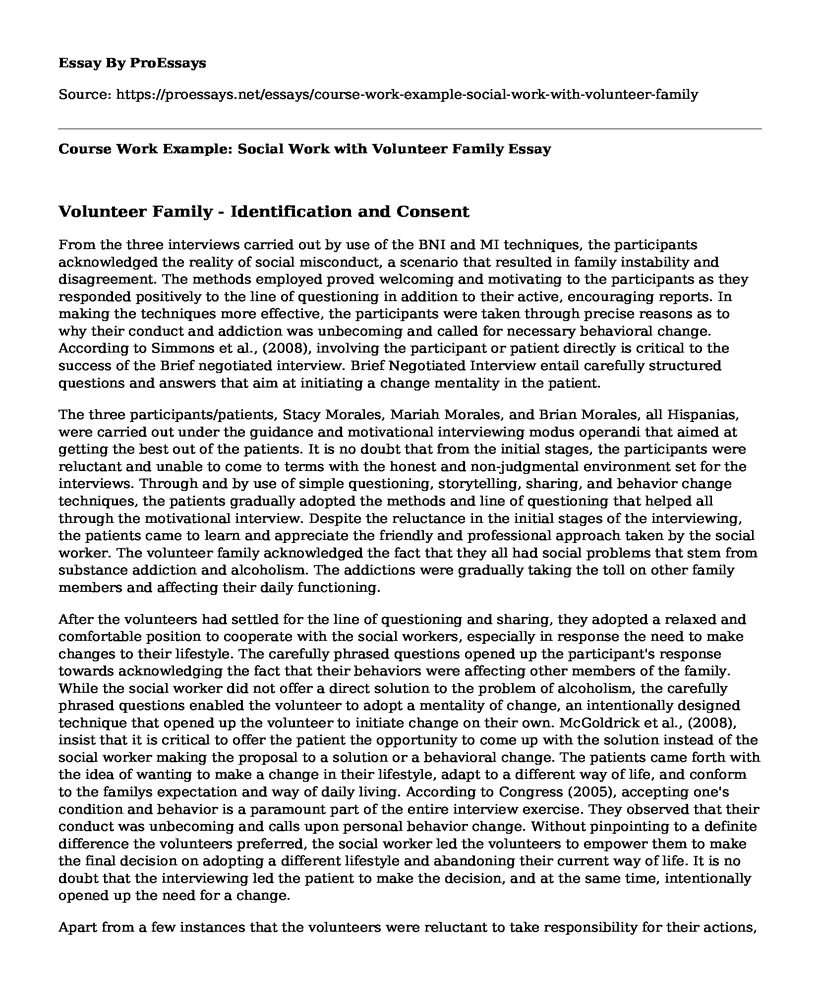Volunteer Family - Identification and Consent
From the three interviews carried out by use of the BNI and MI techniques, the participants acknowledged the reality of social misconduct, a scenario that resulted in family instability and disagreement. The methods employed proved welcoming and motivating to the participants as they responded positively to the line of questioning in addition to their active, encouraging reports. In making the techniques more effective, the participants were taken through precise reasons as to why their conduct and addiction was unbecoming and called for necessary behavioral change. According to Simmons et al., (2008), involving the participant or patient directly is critical to the success of the Brief negotiated interview. Brief Negotiated Interview entail carefully structured questions and answers that aim at initiating a change mentality in the patient.
The three participants/patients, Stacy Morales, Mariah Morales, and Brian Morales, all Hispanias, were carried out under the guidance and motivational interviewing modus operandi that aimed at getting the best out of the patients. It is no doubt that from the initial stages, the participants were reluctant and unable to come to terms with the honest and non-judgmental environment set for the interviews. Through and by use of simple questioning, storytelling, sharing, and behavior change techniques, the patients gradually adopted the methods and line of questioning that helped all through the motivational interview. Despite the reluctance in the initial stages of the interviewing, the patients came to learn and appreciate the friendly and professional approach taken by the social worker. The volunteer family acknowledged the fact that they all had social problems that stem from substance addiction and alcoholism. The addictions were gradually taking the toll on other family members and affecting their daily functioning.
After the volunteers had settled for the line of questioning and sharing, they adopted a relaxed and comfortable position to cooperate with the social workers, especially in response the need to make changes to their lifestyle. The carefully phrased questions opened up the participant's response towards acknowledging the fact that their behaviors were affecting other members of the family. While the social worker did not offer a direct solution to the problem of alcoholism, the carefully phrased questions enabled the volunteer to adopt a mentality of change, an intentionally designed technique that opened up the volunteer to initiate change on their own. McGoldrick et al., (2008), insist that it is critical to offer the patient the opportunity to come up with the solution instead of the social worker making the proposal to a solution or a behavioral change. The patients came forth with the idea of wanting to make a change in their lifestyle, adapt to a different way of life, and conform to the familys expectation and way of daily living. According to Congress (2005), accepting one's condition and behavior is a paramount part of the entire interview exercise. They observed that their conduct was unbecoming and calls upon personal behavior change. Without pinpointing to a definite difference the volunteers preferred, the social worker led the volunteers to empower them to make the final decision on adopting a different lifestyle and abandoning their current way of life. It is no doubt that the interviewing led the patient to make the decision, and at the same time, intentionally opened up the need for a change.
Apart from a few instances that the volunteers were reluctant to take responsibility for their actions, the interview proceeded without verbal confrontation as the participants gradually and comfortably took up the cue to offer and share how they would like to initiate change and make a difference in their livelihood. To an extent, the session provided the patients an opportunity to empower themselves towards effective decision making and formulation of a practical strategy to initiating behavior change and adopting new measures to confronting unbecoming social behaviors such as alcoholism and substance abuse. The entire session and interview proved very successful as the participants acknowledged that they indeed needed to make changes in their habits.
References
Congress, E. P. (2005). Cultural and ethical issues in working with culturally diverse patients and their families: The use of the Culturagram to promote culturally competent practice in health care settings. Social Work in Health Care, 39(3-4), 249-262.
McGoldrick, M., Gerson, R., & Petry, S. S. (2008). Genograms: Assessment and intervention. WW Norton & Company.
Simmons, C. S., Diaz, L., Jackson, V., & Takahashi, R. (2008). NASW cultural competence indicators: A new tool for the social work profession. Journal of Ethnic & Cultural Diversity in Social Work, 17(1), 4-20.
Cite this page
Course Work Example: Social Work with Volunteer Family. (2021, Jun 17). Retrieved from https://proessays.net/essays/course-work-example-social-work-with-volunteer-family
If you are the original author of this essay and no longer wish to have it published on the ProEssays website, please click below to request its removal:
- Reflection Paper on Sweat Lodge by Bryan Little Chief
- Essay Example on Robotic Companions: The Future of Human Life?
- Combating COVID-19: A Capstone Project for Saving Lives - Essay Sample
- New York City: A Vibrant and Busy Metropolis - Essay Sample
- Essay Example on COVID-19: Global Pandemic Impact & Hope for the Future
- Essay Sample on Solving Ethical Dilemmas in Social Work
- Leadership Practices on Nurse Retention - Research Paper Sample







